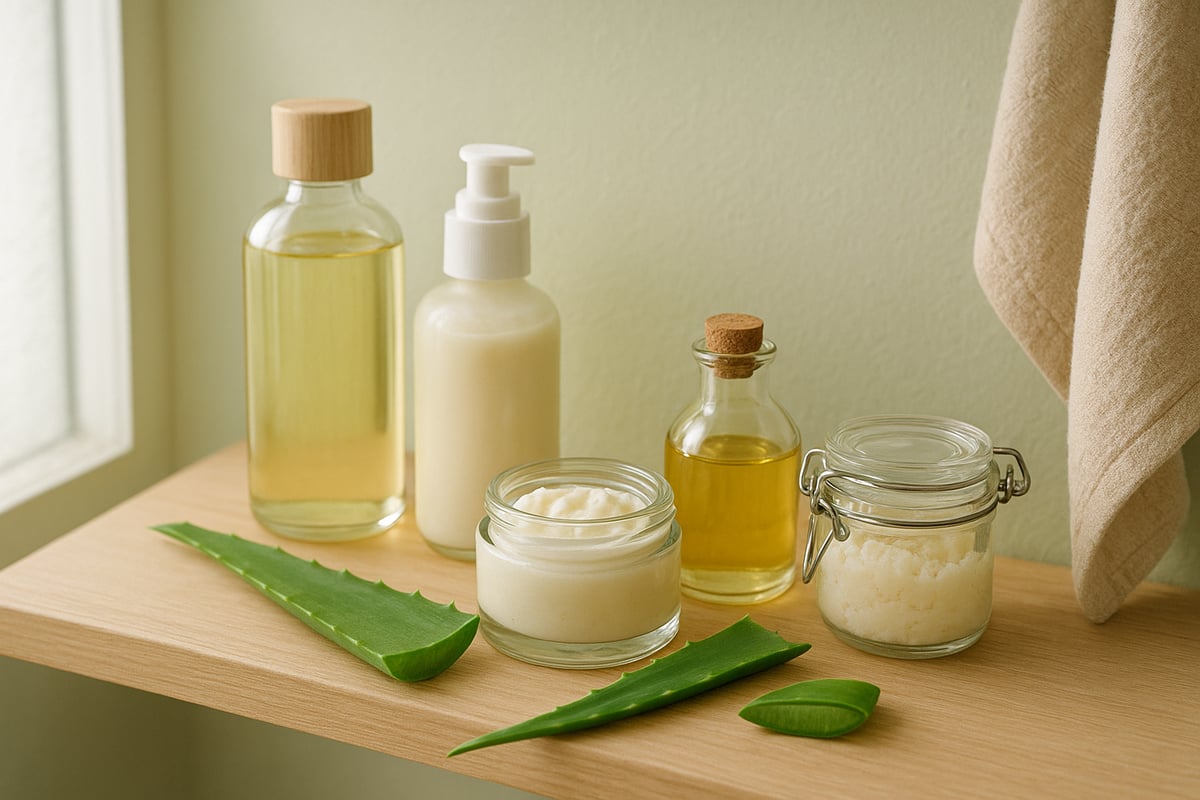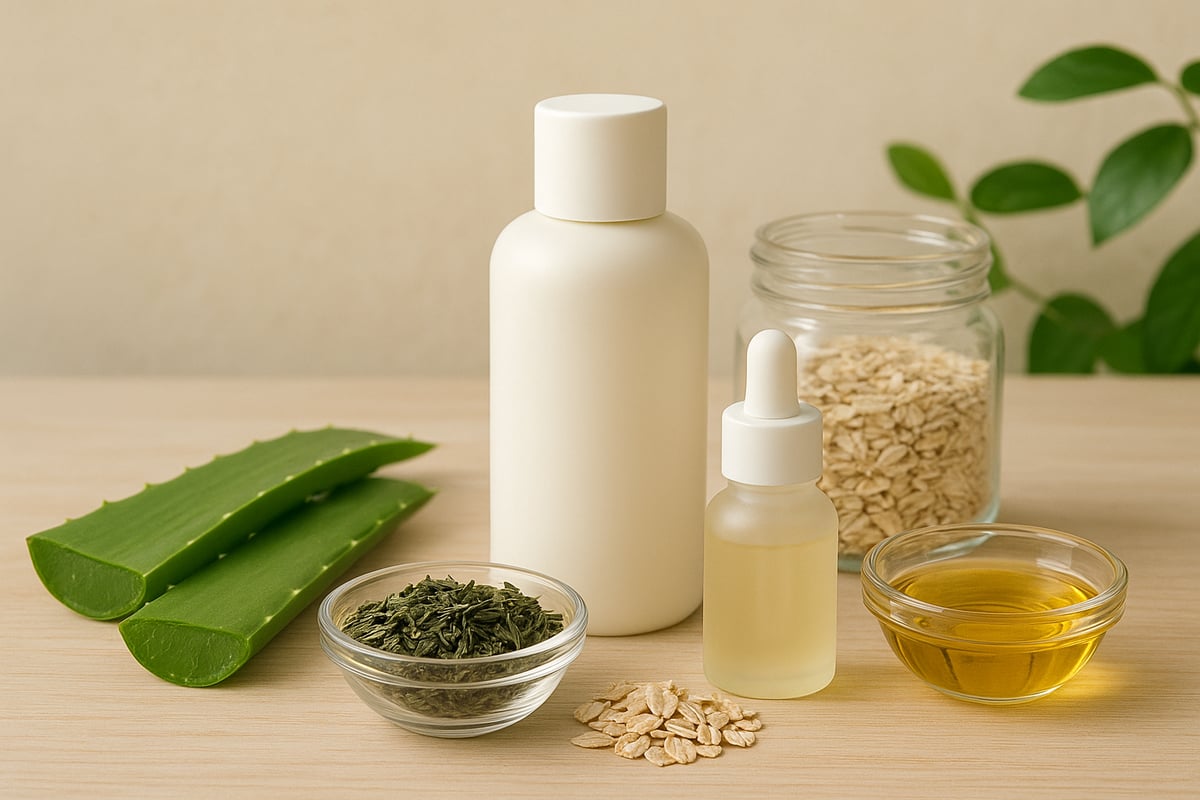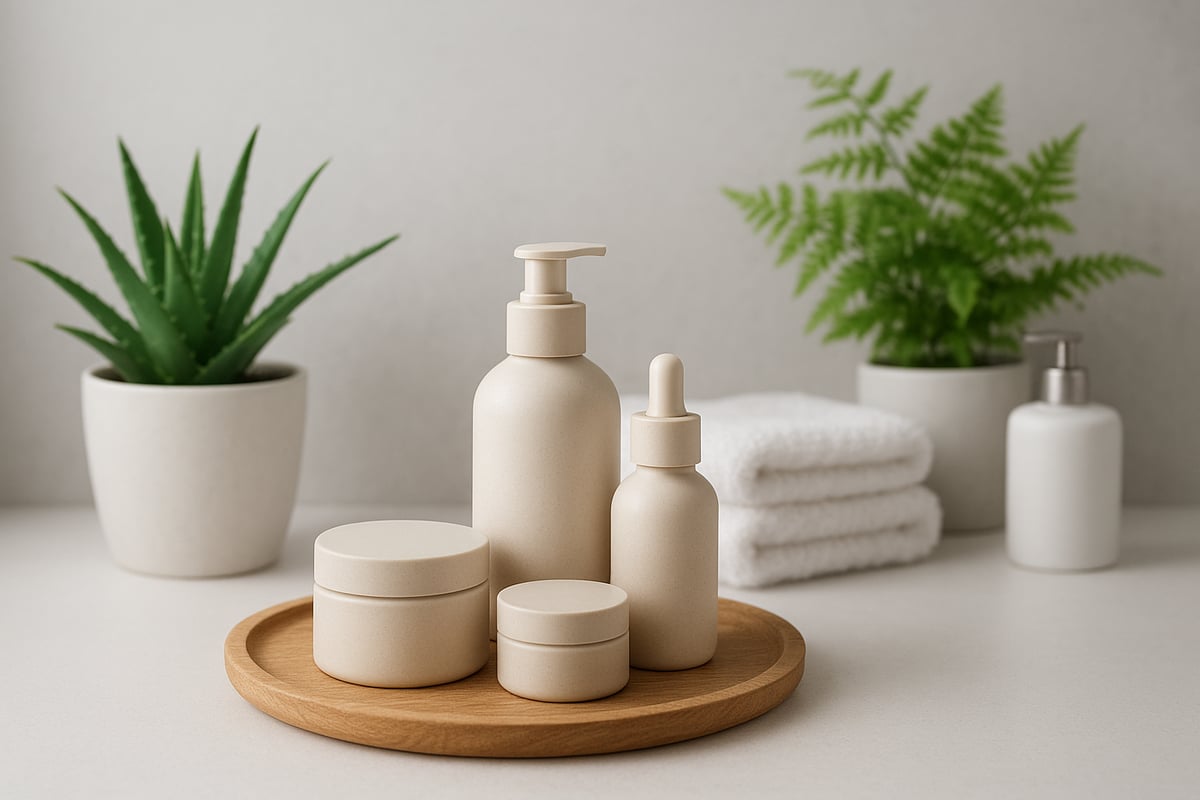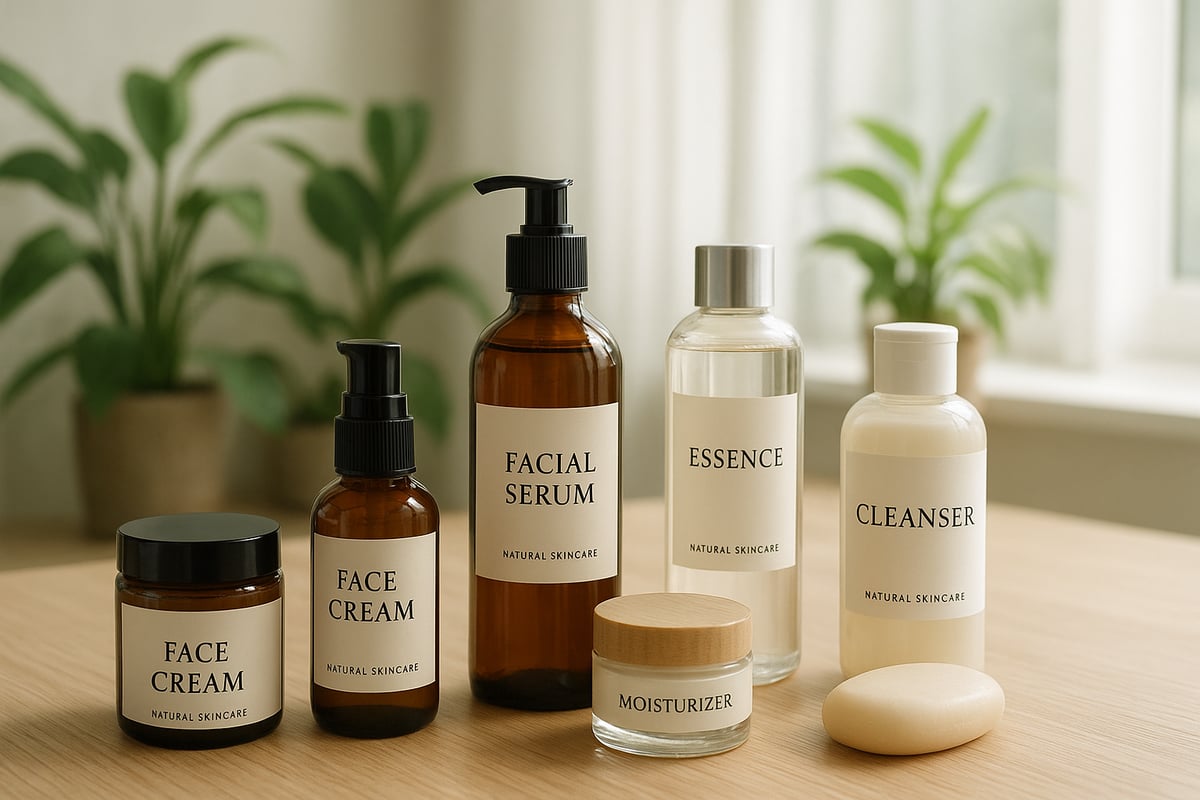Do you want to wake up with radiant skin every day, without compromising your health or the environment? Natural skin care gives you the opportunity to care for your skin with care and modern ingredients directly from nature.
In this guide, you'll gain insight into why natural skincare is more than just a trend in 2025. We'll walk you through proven ingredients, show you how to build an effective routine, and help you avoid common mistakes. Discover how to achieve radiant, healthy skin, step by step, with the power of nature.
Why Choose Natural Skincare in 2025?
Choosing natural skincare is becoming increasingly popular heading into 2025. Many people want to minimize their exposure to unnecessary chemicals while taking responsibility for the environment. But what does it really mean to invest in natural skincare and why is it more than just a trend?

Benefits of natural skin care
The benefits of natural skin care are many. One of the biggest is reduced exposure to synthetic chemicals and hormone disruptors. Many natural ingredients are rich in antioxidants, vitamins, and essential fatty acids that strengthen the skin's barrier and protect against external stressors. Studies published in JAMA Dermatology in 2019 show that natural formulations often pose less risk of skin irritation, especially for sensitive skin.
Another important aspect is sustainability. Natural skin care often uses ingredients from organic farming and environmentally friendly production processes. The packaging is also designed to have as little climate impact as possible, which appeals to the environmentally conscious consumer. Consumer trends show that 68% of Swedes believe that natural ingredients are crucial when purchasing skin care.
Here are some popular natural ingredients:
- Organic aloe vera: soothes and moisturizes the skin
- Cold-pressed jojoba oil: balances sebum production
- Shea butter: re-greases and protects against external influences
According to The Benefits of Natural Skin Care, these ingredients can both reduce the risk of allergies and contribute to healthier skin in the long run.
Comparison table:
| Benefits of natural skin care | Common synthetic alternatives |
|---|---|
| Less risk of irritation | May contain strong preservatives |
| Environmentally friendly production | Often higher climate impact |
| Natural antioxidants and fatty acids | Fewer nutrients |
Common misconceptions and facts
However, there are several misconceptions about natural skin care. Many people believe that natural is always better, but the truth is more nuanced. Some natural substances, such as poison ivy or citrus oils, can cause severe reactions. At the same time, synthetic ingredients are not necessarily harmful; some are both safe and effective.
The regulation of the terms "natural" and "organic" is often flawed. Neither the USDA nor the FDA has a clear definition, making it difficult for consumers to know exactly what is in the product. That's why it's important to read the INCI list and choose products from transparent brands.
Statistics show that 68% of Swedish consumers prioritize natural ingredients, but many are not aware that even natural products can cause allergies or be unstable. Therefore, knowledge and source criticism are required when choosing natural skin care, to avoid common pitfalls and get the best results.
Natural Ingredients: Heroes and Villains for Your Skin
Choosing the right ingredients is crucial for those who want to invest in natural skincare. Here we guide you through both the most acclaimed natural substances and those that can be harmful, as well as how to ensure that the products stay fresh and effective.

Ingredients to love
When it comes to natural skin care, there are several ingredients that are repeatedly highlighted for their positive effects. Aloe vera is a classic that soothes, moisturizes and strengthens the skin's protective barrier. Green tea extract is rich in antioxidants and helps protect against harmful free radicals.
Oat extract is known for its softening and anti-inflammatory properties, making it perfect for sensitive skin. Jojoba oil, argan oil and shea butter nourish, balance sebum production and contribute to a healthy glow. Plant-based hyaluronic acid effectively binds moisture and gives the skin a plump, youthful appearance.
Vitamins like E and B3 (niacinamide) strengthen the skin's resistance and give it an extra glow. Studies show that chamomile extract and bisabolol can reduce redness and irritation, especially in people with reactive skin. If you want to read more about which natural substances make a real difference, we recommend Skincare ingredients that make a difference .
By regularly using these key ingredients in your natural skincare routine, you will get a routine that both strengthens and protects the skin in depth.
Ingredients to avoid
Although much of natural skin care is based on pure ingredients, there are also natural substances that can be problematic. Essential oils from citrus, lavender and peppermint are common in natural products, but can cause irritation or increased sensitivity to light. Alcohol, certain nut oils and herbs such as arnica and oak bark have documented risks of allergy.
Perfumes and fragrances, even if they are natural, are a common cause of skin reactions. Citrus oils are particularly risky as they increase sun sensitivity and thus the risk of pigment spots. According to current research, you should be careful with the following substances in your natural skin care:
- Alcohol
- Citrus oils
- Lavender
- Peppermint
- Rosemary
- Thyme
- Ylang-ylang
Reading the INCI list carefully and choosing products with fewer, well-proven ingredients reduces the risk of reactions and strengthens your confidence in your natural skincare.
Packaging and shelf life
Natural ingredients are often sensitive to light, air and bacteria. If the product is stored in an open jar or transparent bottle, the effectiveness of important antioxidants can decrease rapidly. Studies show that a jar cream can lose up to 40 percent of its antioxidant capacity in just one month when exposed to light.
To maximize the effectiveness of your natural skincare, choose products in opaque, airtight packaging. Pump bottles and tubes reduce the risk of oxidation and bacterial growth. Always check the expiration date and store products in a cool, dark place for best results.
By thinking about both content and packaging, you protect your investment in your natural skincare and get the maximum effect from every drop.
Build Your Natural Skincare Routine Step by Step
Building a sustainable and effective natural skincare routine is all about understanding your skin's needs and choosing the right steps. With the right approach, you'll have radiant skin that both feels and looks healthy. Below is a step-by-step guide where each part is tailored to maximize the effects of natural skincare.

1. Cleaning
The first and most important step in natural skin care is a gentle cleanse. Choose products without sulfates and harsh surfactants to avoid drying out the skin.
- Oil-based cleansers with jojoba or coconut are suitable for all skin types.
- Gentle micellar waters with oat extract are good for sensitive skin.
- Avoid products with alcohol or strong perfume.
A gentle cleanse helps the skin maintain its natural balance and prepares it for the next step in your routine.
2. Hydration
After cleansing, the skin needs moisture and nourishment. Natural skin care is based on the layer-by-layer method, where thin layers provide optimal absorption.
- Serum with plant-based hyaluronic acid effectively binds moisture.
- Light creams with aloe vera or shea butter are suitable for different skin types.
- Facial oils with jojoba or argan provide extra nourishment, especially in the evening.
Hydration is crucial for skin elasticity and radiance.
3. Exfoliation
Exfoliation is an important step in natural skin care but should be done gently. Natural acids like AHA from fruit or BHA from willow bark add radiance and accelerate cell renewal.
- Use mild chemical exfoliants 1–2 times a week.
- Avoid coarse grains that can damage the skin.
- Choose products without unnecessary additives and fragrances.
Proper exfoliation prevents clogged pores and makes the skin more receptive to hydration.
4. Protection and nutrition
Protect your skin during the day with natural UV filters and provide extra nourishment at night. Natural skin care focuses on ingredients that strengthen the skin barrier.
- Day cream with zinc oxide provides physical sun protection.
- Antioxidant-rich oils and extracts, such as vitamin E, are used in the evening.
- Avoid products with citrus oils which can increase sun sensitivity.
Protection and nutrition are the key to long-term skin health.
5. Special care
If necessary, you can add special products to your natural skincare routine. These can include masks, spot treatments or serums with specific effects.
- Clay masks and oats provide extra calm to irritated skin.
- Honey masks moisturize and soften.
- Spot treatments with licorice root or green tea reduce pigment spots.
Special care is adapted to the skin's current needs and the season.
6. Adapt to skin type and season
Natural skin care gives the best results when you adapt your routine to your skin type and climate. Feel what your skin needs and adjust as needed.
- Dry skin: More oils and richer creams, especially during the winter.
- Oily/combination skin: Light, water-based products that don't clog.
- Sensitive skin: Avoid fragrances, choose soothing extracts such as chamomile and oats.
By listening to your skin, you will get the maximum effect from your natural skin care.
7. Sample routine and natural glow
A simple but effective natural skin care routine might look like this:
| Step | Morning | Evening | 1-2 times/week |
|---|---|---|---|
| Cleaning | ✔ | ✔ | |
| Serum | ✔ | ✔ | |
| Day cream | ✔ | ||
| Facial oil | ✔ | ||
| Mask | ✔ |
Would you like more tips on how to get radiance and a natural glow without makeup? Then you can read more here: Tips for a natural glow without makeup .
With a well-thought-out and customized natural skin care routine, you will build healthy, balanced and radiant skin in the long term.
Common Mistakes and How to Avoid Them
Choosing natural skin care can feel safe, but it's easy to make mistakes even with the most carefully selected products. Many people think that natural automatically means gentle and safe, but the reality is more complex. To help you avoid pitfalls, we've listed the most common mistakes - and how you can best protect your skin.

Common mistakes in natural skin care
The first mistake is to assume that natural skin care is always gentle. Some natural substances, such as essential oils (citrus, lavender, peppermint), can cause irritation or allergic reactions. Overuse of exfoliating products, even if they are natural, can disrupt the skin barrier and lead to redness or dryness.
Another common problem is combining too many active ingredients without sufficient knowledge. This can make the skin unbalanced and sensitive. Many people also miss the importance of proper packaging – natural ingredients are often sensitive to light and air, which means that the effect quickly deteriorates if the product is stored incorrectly.
Skipping sunscreen is a common mistake when it comes to natural skincare. Some people believe that natural oils or extracts provide enough protection, but a dedicated UV filter is required even in natural routines.
How to avoid pitfalls in natural skincare
To avoid these mistakes, always read the INCI list carefully and choose products with few, well-proven ingredients. Avoid products with strong fragrances, especially if you have sensitive skin. Always test new products on a small area of skin before applying them to your entire face.
Be careful with exfoliation – even natural acids should be used in moderation, no more than a couple of times a week depending on your skin type. Make sure the products are packaged in opaque, airtight containers to protect the active ingredients from oxidation.
Don't blindly trust marketing that promises "green" effects. Instead, review the facts and research support behind the ingredients. If you want to read more about common misconceptions about natural skin care and which substances are actually safe, we recommend the article Is natural skin care really best? .
Practical tips for safe natural skin care
Below is a quick guide to avoid the most common mistakes:
| Mistake | How to avoid it |
|---|---|
| Overuse of exfoliation | Maximum 1–2 times/week |
| Strong fragrances | Choose fragrance-free products |
| Wrong packaging | Invest in airtight, dark bottles |
| Skip sunscreen | Always use UV protection, even natural ones |
| Mix many active ingredients | Keep the routine simple, max 2–3 active ingredients |
Remember that natural skincare requires knowledge and thought. By paying attention to ingredients, packaging, and your own skin reactions, you can get the most out of your routine – and avoid unnecessary problems along the way.
Trends and the Future of Natural Skincare 2025
The future of natural skincare is characterized by innovation, conscious consumer choices and scientifically grounded ingredients. Already in 2025, we see how the demand for sustainable solutions and efficiency is fundamentally changing the industry. How can you prepare for the new landscape in natural skincare?
Biotechnology and new ingredients
A clear trend in natural skin care is the use of biotechnologically produced ingredients. Examples include plant-based hyaluronic acid and fermented extracts, which offer both effectiveness and gentleness. Adaptogens such as reishi and ashwagandha are used to strengthen the skin's resistance to stress.
More and more consumers are demanding scientific evidence that natural ingredients really work. If you want to delve deeper into this, you can read more about the science behind organic skincare , where current studies and research results are presented.
Minimalism and multifunctional products
Minimalist routines are gaining ground in natural skincare. Fewer products, but with more functions, make it easier to create a sustainable and effective routine. Multifunctional serums or creams that combine hydration, protection and nutrition reduce both waste and climate impact.
Packaging is also evolving rapidly. Reusable and compostable materials are becoming more common, contributing to reduced waste and a more circular economy. This reflects an increased focus on sustainability throughout the product lifecycle.
Traceability, local production and transparency
Transparency around ingredients and origins is central to the future of natural skincare. With the help of QR codes and blockchain technology, consumers can follow every step in the production chain, from cultivation to finished product. Locally produced and small-scale alternatives are prioritized by conscious customers who want to reduce their carbon footprint.
According to the Swedish Consumer Barometer 2024, 54% of consumers prefer brands with a clear sustainability profile. This is driving the trend towards more responsible natural skincare, where ethics, environment and effectiveness go hand in hand.
Natural Skin Care for Different Skin Types and Needs
Choosing the right natural skincare for your skin type is crucial to achieving the best results. Each skin type has its own challenges and needs, and by adapting ingredients and routines, you can support your skin's balance and radiance with the power of nature.
Acne-prone skin
For those with acne-prone skin, natural skincare is often a safe choice when you choose the right ingredients. Willow bark extract (a natural BHA) helps cleanse pores and reduce inflammation. Green tea extract and tea tree in low concentrations can also combat impurities without drying out the skin.
- Willow bark extract for gentle exfoliation
- Green tea for antioxidant protection
- Tea tree (max 1%) against bacteria
Avoid strong oils and essential oils, as these can worsen the condition.
Mature skin
Mature skin needs extra nourishment and protection. Tailored natural skin care with antioxidants such as vitamin C, E and omega fatty acids strengthens the skin's elasticity and gives it radiance. Rosehip oil is particularly appreciated for its regenerating effect.
- Vitamin C and E for protection against free radicals
- Omega fatty acids for hydration
- Rosehip oil for cell renewal
Feel free to use products with fermented extracts for extra vitality.
Sensitive skin
Sensitive skin reacts easily to both synthetic and natural substances. Here, natural skin care with soothing ingredients such as oats, bisabolol, chamomile and calendula is particularly valuable. They reduce redness and irritation and strengthen the skin barrier.
- Oat extract for hydration
- Bisabolol and chamomile to reduce irritation
- Marigold for healing
For more tips on products and routines, please see Natural Skin Care for Sensitive Skin .
Dry skin
Dry skin needs intense hydration and protective fatty acids. Invest in natural skin care that contains shea butter, avocado oil and squalane. These ingredients soften and protect the skin from external stressors.
- Shea butter for deep nourishment
- Avocado oil for softening effect
- Squalane for long-lasting hydration
Avoid alcohol and drying fragrances, even if they are natural.
Pigment spots and uneven skin tone
Do you have problems with age spots? Natural skin care with licorice root, niacinamide and cranberry extract can combat hyperpigmentation. Studies show that licorice root extract can reduce age spots by up to 20% after eight weeks.
- Licorice root to brighten skin
- Niacinamide for even skin tone
- Cranberry extract against free radicals
Explore more solutions on Skincare for different skin types if you want to customize your routine further.
It's always a good idea to test new products on a small area of skin first, especially when switching to natural skincare. Adapt your choice to your skin type and listen to your skin's signals for best results.
Natural Skin Care: Myths, Facts, and Expert Advice
Choosing natural skincare often involves a desire for cleaner products and better results, but there are several myths to be aware of. Many people believe that organic products are automatically better, but certification doesn't always guarantee safety or effectiveness.
Common myths and facts:
| Myth | Facts |
|---|---|
| Organic is always best | Certification shows origin, not always efficacy or safety. |
| Natural ingredients are always gentle | 30% of skin reactions are caused by natural fragrances (Contact Dermatitis, 2016). |
| Synthetic is dangerous | Well-chosen synthetic ingredients can be both safe and effective. |
Natural ingredients are often unstable and may require preservatives to ensure the product remains safe over time. It is important to understand that even natural substances can cause allergies, especially fragrances that are often added to natural skin care.
USDA labels and similar certifications serve primarily as marketing standards. They do not provide a guarantee of quality or results. Therefore, it is always wise to read the INCI list carefully and not blindly rely on labels.
Expert advice for those who want to optimize your natural skincare:
- Consult a dermatologist if you have long-term or severe skin problems.
- Test new products on a small area of skin first, especially if they contain natural fragrances.
- Feel free to combine natural ingredients with scientifically proven substances for the best possible results.
- Choose products with few and clear ingredients.
If you want to supplement your natural skincare with extra nutrition, you can explore natural face masks and special care that are developed to give the skin an extra boost while minimizing the risk of unnecessary additives.
By being aware of both the benefits and risks of natural skin care, you can create a balanced and effective routine. Always seek knowledge and choose products based on both the ingredient list and scientific basis.
After guiding you through the benefits of natural skincare, key ingredients and how to avoid common mistakes, you may feel ready to take the next step towards healthy, radiant skin yourself. At Éclore, we know how much of a difference the right products can make, especially when they are carefully selected to give your skin radiance and balance without compromising on quality or the environment. If you’re curious to discover natural alternatives that fit your routine, you can easily browse our range and find your new favourites.


